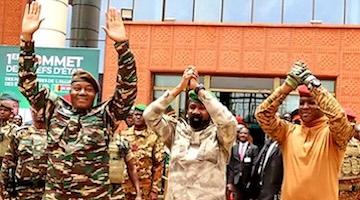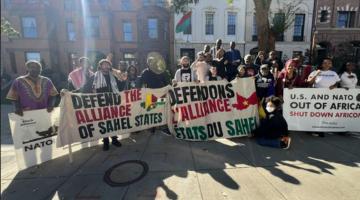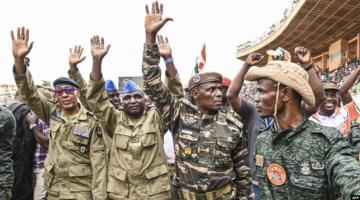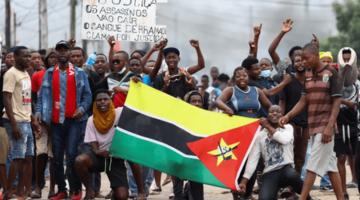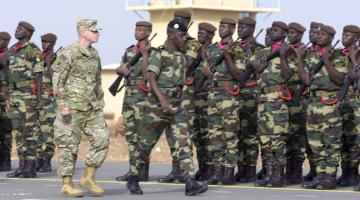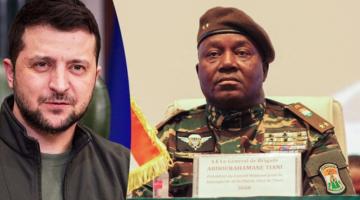U.S. Troop Deaths in Niger: AFRICOM’s Chickens Come Home to Roost
“The Trump administration is talking about a potential imminent U.S. military action to hit back.”
From the outset, the U.S. Africa Command (AFRICOM) has incorrectly presumed the stupidity of Africans and others who are concerned about the continent. To answer accusations that the U.S. uses its military to ensure continuing imperialist domination of Africa, AFRICOM has stubbornly insisted that its sole objectives are to advise and support the armies of African government “partners” and to provide humanitarian assistance. But we know the truth to be otherwise.
U.S. Army General Donald Bolduc shamelessly told NBC News: “America is not at war in Africa. But its partner forces are.” But even a soldier can recognize the farce. Former Green Beret Derek Gannon said: “[U.S. military involvement in Africa] is called Low Intensity Irregular Warfare, yet technically it’s not considered war by the Pentagon. But warfare is warfare to me.”
The U.S. maintains two facilities in Africa that qualify as military bases. However, according to NBC the U.S. increased the number of embassy-based military missions called “Offices of Security Cooperation” from nine in 2008 to 36 in 2016. Researchers say the U.S. military now has a presence in at least 49 African countries, presumably to fight terrorism. Even if anti-terrorism were the actual ultimate objective, military.com has pointed out: “The U.S. has found some of its efforts to fight extremists hobbled by some African governments, whose own security forces are ill-equipped to launch an American-style hunt for the militants yet are reluctant to accept U.S. help because of fears the Americans will overstay their welcome and trample their sovereignty.”
“Researchers say the U.S. military now has a presence in at least 49 African countries, presumably to fight terrorism.”
In the face of Africa’s suspicion, the U.S. still sees strategic benefits to extending AFRICOM’s tentacles into every corner of the continent. In one case the Obama Administration sent 100 troops to Niger in 2013 to set up a drone base in a location where the U.S. was already providing aerial refueling assistance to the French. By June of this year, the number of U.S. military personnel in Niger had grown to at least 645, and by now there may be as many as 800 U.S. troops in that country. While the military establishment may believe that ever-deepening engagement of this kind is helpful to U.S. interests, there is a cost. Earlier this month four U.S. soldiers in Niger were killed in a firefight with alleged terrorist forces. According to at least one account:
“On October 5, about 30 Nigerien troops were patrolling in unarmored trucks alongside a dozen U.S. Army soldiers, among them Green Beret special forces. The patrol was coming from a meeting with tribal leaders and came within striking distance of the border between Niger and its war-torn neighbor Mali. The militants rode in on motorcycles and attacked the patrol with rocket-propelled grenades and heavy machine guns, killing eight: four Nigeriens, three Green Berets, and another U.S. soldier whose body wasn’t discovered until two days after the attack.”
Implicit in AFRICOM messaging is that U.S. troops help African soldiers protect helpless Africans from an unwanted “terrorist” presence. However, a CNN report about the ambush in Niger states: “Some of the soldiers who attended the meeting with local leaders said that they suspected that the villagers were delaying their departure, stalling and keeping them waiting, actions that caused some of them to suspect that the villagers may have been complicit in the ambush...”
“By June of this year, the number of U.S. military personnel in Niger had grown to at least 645, and by now there may be as many as 800 U.S. troops in that country.”
Military commanders who intervene in other countries should know that when non-combatant villagers have taken up the cause of any group -- regardless of the group’s objectives -- a military victory for the interveners is practically hopeless. Nevertheless, “[m]ultiple officials told CNN that the Trump administration is talking to the Nigerien government about a potential imminent U.S. military action to hit back at the militant group that killed the American soldiers.”
Under U.S. law, Congress has the opportunity to arrest any continuing reckless military engagement by Trump. The War Powers Resolution provides that under certain circumstances a President can deploy troops into combat situations, but there are periodic reporting requirements for a President as well as time limits on how long troops can remain engaged in conflicts without a formal declaration of war or specific Congressional authorization. Nevertheless, the Congress has a history of failing to curb U.S. military intervention in other countries, and we should not expect them to do it now. Notwithstanding the deaths in Niger, Africa is not regarded in the minds of Congress or the broader public as a place where the U.S. is at war.
AFRICOM has been confident of its ability to expand the U.S. military presence in Africa while flying below the radar because of its supposed advisory role. Its plan has been to use proxy African soldiers to engage in actual combat without worries of U.S. casualties and the attendant controversies and backlash. But the deaths in Niger represent an unexpected snafu.
“Congress has a history of failing to curb U.S. military intervention in other countries.”
While it may be true that on this occasion, the deaths in Niger faded quickly from media focus, and consequently from the attention of the U.S. public, there is good reason to believe there are more deaths to come. Africans are not stupid, but U.S. military officials are if they ignore the possibility that even the most humble African villagers passionately resent an ever-widening presence of U.S. military personnel in their communities. These humble people may lack the wherewithal to effectively demonstrate their hostility, but the recent killings in Niger with the suspected assistance of villagers evidence the possibility that there are forces eager to exploit African anger and confusion about the presence of U.S. troops.
If the death toll of U.S. troops continues to climb and AFRICOM loses its low profile, there should be no surprise in the Pentagon about its chickens coming home to roost.
Mark P. Fancher is an attorney who writes periodically for Black Agenda Report. He can be contacted at mfancher(at)Comcast.net.


